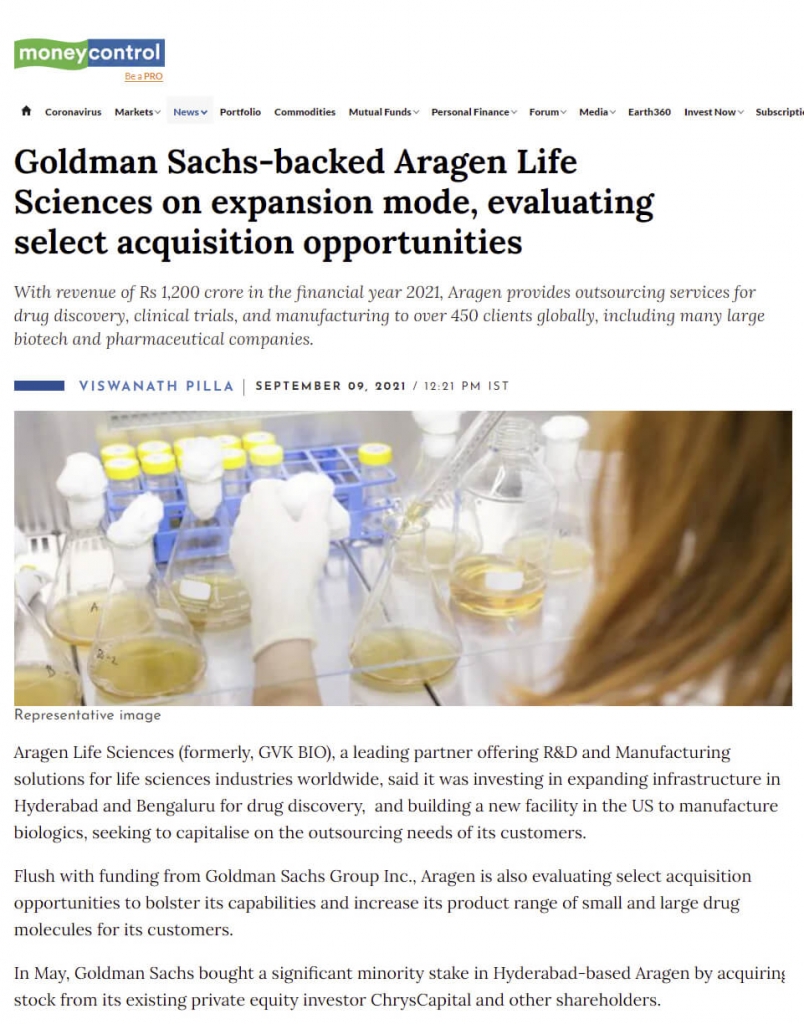 Back to News
Back to News
Goldman Sachs-backed Aragen Life Sciences on expansion mode, evaluating select acquisition opportunities
September 09, 2021

With revenue of Rs 1,200 crore in the financial year 2021, Aragen provides outsourcing services for drug discovery, clinical trials, and manufacturing to over 450 clients globally, including many large biotech and pharmaceutical companies.
Aragen Life Sciences (formerly, GVK BIO), a leading partner offering R&D and Manufacturing solutions for life sciences industries worldwide, said it was investing in expandOn Aragen’s much anticipated initial public offering (IPO), the CEO said the company’s current focus is on meeting the growing needs of iing infrastructure in Hyderabad and Bengaluru for drug discovery, and building a new facility in the US to manufacture biologics, seeking to capitalise on the outsourcing needs of its customers.
Flush with funding from Goldman Sachs Group Inc., Aragen is also evaluating select acquisition opportunities to bolster its capabilities and increase its product range of small and large drug molecules for its customers.
In May, Goldman Sachs bought a significant minority stake in Hyderabad-based Aragen by acquiring stock from its existing private equity investor ChrysCapital and other shareholders.
“We now work with the global Goldman Sachs team, harness their intellectual horsepower, lever their strategic thinking, and invest judiciously with our access to significant capital,” Manni Kantipudi, chief executive officer of Aragen, said in an interview with Moneycontrol. “We have some exciting (acquisition) opportunities that we will evaluate and prioritise over the next 12 months.”
With revenue of Rs 1,200 crore in the financial year 2021, Aragen provides outsourcing services for drug discovery, clinical trials, and manufacturing to over 450 clients globally, including many large biotech and pharmaceutical companies.
Kantipudi said there was great interest among drugmakers in biologics, which are drugs derived from humans, animals, or microorganisms by using biotechnology, and biosimilars, or copies of biologics. To tap this potential demand, Aragen is investing in a manufacturing facility in the US to offer a single seamless solution to outsourcing clients interesting in developing and manufacturing such drugs in the West.
Kantipudi, who has been with the company since 2007, led the acquisition of a biologics service provider in the US in 2014 (Aragen Bioscience), making GVK BIO one of the first companies out of India to offer both small and large drug molecule solutions to its clients.
On Aragen’s much anticipated initial public offering (IPO), the CEO said the company’s current focus is on meeting the growing needs of its customers.
“Our management team, along with our Board, will assess such opportunities and identify the one that best fits the expectations of our shareholders, employees, and customers,” Kantipudi said.
Kantipudi said that with over 95 percent of the company’s revenue coming from the West, GVK BIO was rebranded as Aragen Life Sciences to combine small molecule (GVK BIO) and the biologics (Aragen BioSciences) platforms into one seamless solution for customers.
COVID-19 impact
On the impact of the coronavirus disease (COVID-19) on contract service companies, Kantipudi said the pandemic had placed greater focus on outsourcing in the pharma sector.
“A number of customer sites were shut down for an extended period. This has delayed their progress, necessitating the access to resources to make up for such delays. Many of our customers have increased the volume and nature of work with us. We have been consistently expanding our capacities and capabilities to meet their growing needs,” Kantipudi said.
“We expect to see this trend to continue. We have drawn up plans to build capacities, create capabilities and also attract the talent required to cater to this growing demand in the coming years,” he added.
Asked about the prospects of the Indian contract services industry, Kantipudi said that in 2020 alone, the sector attracted over $23 billion in venture investments.
“With access to this capital, there is going to be a growing demand in outsourcing to contract research organizations globally,” he said.
“India has come a long way in creating world-class infrastructure and offering cutting edge research, and is an attractive option to companies in the US/EU (European Union),” Kantipudi said.
In the outsourcing of manufacturing, Kantipudi cited signs that the production of some clinical and commercial active pharmaceutical ingredients (APIs) was moving back to the West.
“Nevertheless, the West just does not have enough capacity to manufacture all steps of the APIs. So, we expect to see a number of starting materials, intermediates, advanced intermediates, and regulated starting materials being supplied from the East even as the final steps are carried out in the West. In conclusion, we expect India to grow and benefit from the expected growth in needs for discovery, development, API, and drug product manufacturing,” he said.
“The investors are flocking into CROs because they expect this sector to grow faster than generics in the next 3-4 years,” said Vishal Manchanda, Pharma analyst at Nirmal Bang Institutional Equities.
“CROs are trying to go above the value chain from catering to the needs of generic industry to serving biotech and multinational drug companies in developing and manufacturing new chemical entities, biologics, vaccines, and biosimilars. This would require significant investment on regulatory, scientific, and manufacturing capabilities,” Manchanda added.
According to market research firm Markets and Markets, in 2020, the value of the global (CRO) services market was estimated at $47.77 billion while the global pharmaceutical contract manufacturing market was valued at $109.67 billion.
During the forecast period of 2020 to 2025, the CRO market is estimated to grow at a CAGR of 9.1 percent to reach $73.77 billion. During the same period, the Contract Manufacturing Organization market is expected to grow at a CAGR of 6.4 percent to reach $162.1 billion.
Source: moneycontrol

